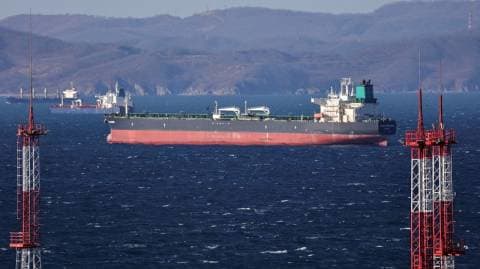
By Vladimir Soldatkin and Olesya Astakhova
(Reuters) -The Russian government is ready to ease a ban on diesel exports in coming days, the daily Kommersant reported on Wednesday, citing unidentified sources, while Deputy Prime Minister Alexander Novak said the restrictions were working.
Despite being one of the world's top oil producers, Russia has suffered high domestic prices and shortages of gasoline and diesel in recent months as high export prices made it advantageous for refiners to sell their products abroad.
"This measure had a positive impact on the situation on the domestic market. Our stockpiles have increased by about 430,000 tonnes during this period," Novak told the Rossiya-24 TV news channel.
He also said he had held a meeting with Russian oil producers earlier on Wednesday.
"We are observing a significant decrease in wholesale prices for oil products in almost all regions. This is the criterion that needed to be achieved," Novak said, without indicating when the export ban would be lifted.
Separately, TASS news agency cited Energy Minister Nikolai Shulginov as saying that the government "at all levels" had been discussing partial permission for fuel exports.
He said further decisions on fuel market regulation would be published in the near future.
PARTIAL LIFTING OF DIESEL EXPORT BAN?
Kommersant reported that the ban would be lifted only on pipeline exports of diesel, and that volumes may be subject to quotas to avoid surges in wholesale prices.
The ban on gasoline exports will remain in force for now, it said.
Diesel is Russia's biggest oil product export, at almost 35 million tonnes last year. It exported 4.8 million tonnes of gasoline.
Novak said last week that Russia may introduce quotas on fuel exports if a complete ban on exports imposed on Sept. 21 does not succeed in bringing down high gasoline and diesel prices.
Prices have fallen on the local exchange since the ban was introduced; gasoline by almost 10%, and diesel by 21%.
The oil pipeline monopoly Transneft's storage facilities are nearly full and it is proving almost impossible to redirect all incoming volumes to the domestic market, Kommersant said.
On Tuesday, Novak said the government was not setting any time frame for the fuel export ban.
Analysts' expectations vary on how long the measures will be in effect. JP Morgan said it could last a couple of weeks until harvest season concludes in October, while FGE Energy said replenishing Russia's gasoline stocks could take up to two months.
(Reporting by Lidia Kelly in Melbourne and Vladimir Soldatkin in Moscow; Editing by Simon Cameron-Moore, Kim Coghill and Kevin Liffey)